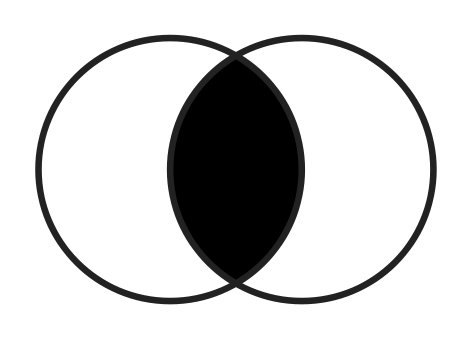By Dari
“It’s like there’s only enough room for me.” I held my hands up to make a roughshod Venn diagram with my fingers. “I’m a Black, Christian, bisexual professional. The place where these identities overlap seems so small, it’s like there’s only enough room for me.” I noticed my counselor’s eyes shrink to a squint as she nodded her head (and seemingly her soul) with understanding. A slow, epiphanous, compassionate nod. And though I knew she would never really understand, for a moment, I felt like she did.
If I am honest, I’m not sure I fully understand. The only thing I know for sure is that I am torn. Usually intersections mean connections. Streets intersect to form corners. Threads intersect to form covers. Fingers intersect and form lovers. But my identities intersect and fray me.
As a Black person, I am expected to be a Christian. And I am. But I’m also expected to be a certain kind of Christian. You know, a Baptist who goes to one of those churches with gospel music, people shouting “Amen!”, church ladies wearing fancy hats, and so forth. Incidentally, I have attended mostly White churches in my 12 years as a Christian. And as of late, I find myself interested in Celtic devotions and attracted to the stoic, contemplative spiritual traditions not typically associated with the heritage of the Black church. I sit in pews of Black churches and simmer with pride and frustration over the simultaneous fortitude and shallowness all around me. I want to stand up and shout, “Stop with the fanfare and deal with your hearts!” I want to stand up and shout, “What about right now?!” For too long, my people have been socially paralyzed and pacified by a religious tradition that focuses on the afterlife. What about right now? I want to shout in White churches too. “Do you realize that you are oppressors?!” I am so sick of hearing about Jesus but not about justice. Hearing about piety but not about privilege. I am never fully in either place. I am torn.
I came out to one of my best friends about a year ago. We first met in a conservative, college campus ministry some years ago, both serving on the leadership committee. We have been close ever since. I told her via email that I was dating a girl and that I was bisexual. “The devil is deceiving you…This is not who you are…I thought we had the same beliefs…This doesn’t make sense…” and so on. She could not wrap her mind around the possibility that I do indeed love Jesus…and sometimes women. Every shocked and shocking statement she made perforated me right along the line where my faith and sexuality met. Most of the women I have dated are totally put off by Christianity. It seems there is a vast chasm of mutually reinforcing ignorance and intolerance between these two communities. And though I try to stand in that gap, I fear my arms cannot reach both sides. But even if they did, I suspect I would be torn asunder by the pulling in opposite directions. I will not forsake my Savior for the next pretty gal who touches the small of my back and winks at me. And I’m tired of hiding my Bible when my latest love interest comes over to cook for me and kiss me under the moon. Yet, I’m beginning to think that the loneliness of a celibate life would make my heart very unlike the heart of Jesus. I am torn.
Today, my friend called me a “strong Black woman.” The moment she said it, I looked down at my coffee with envy. It is strong and black. I don’t know if I am. Maybe others think so. I have a dear friend who fits the description quite well, more so than I do. We are the only ones we let see each other’s weaknesses and vulnerabilities. We entrust each other with our public reputations and our private conversations. This is the privilege and pleasure of Black female friendship. She does not know, though. She does not know that I am bi. My race and my sexuality intersect to form a corner in which I crouch down and hide from the person I most want to see me as I am. But I feel like a betrayer. We have shared beds, shared clothes, and shared hopes. We have shared food and memories and liquor. We are like sisters. But I cannot tell her. It feels like an egregious violation of some unspoken agreement between strong, Black women. A disclosure that invites the kind of judgment we willingly suspend. A disclosure that jeopardizes a sisterhood we cannot afford to relinquish.
DuBois said it best: double consciousness. But what happens when that double consciousness is multiplied times two or three or ten? At every point of intersection, I am split. Torn. Frayed. Where can I go to keep myself together? “You’ve got to find community,” my counselor said. “But which community do I choose?” I asked. “You can be all of these things at the same time, you know.” I want to believe her. I think she is right. But for now, I find it hard to ever fully be everything, because in that space where every part of my identity collides, it seems there’s only room enough for me.
Dari is a 26-year-old, bisexual university instructor and aspiring writer from Atlanta, GA.

